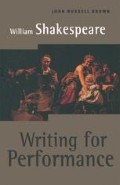Abstract
In our times Shakespeare’s plays are always yielding up new meanings. Philosopher, psychoanalyst (Freudian or Jungian), theologian (Catholic or Protestant), sociologist, historian, Marxist, moralist, hedonist, sceptic, naturalist, poet and, by no means least, teacher, all reinterpret to suit themselves. Books are published about other books all proposing divergent meanings; an example is Harriet Hawkins, The Devil’s Party: Critical Counter-interpretations of Shakespearian Drama (Oxford, 1985). Anthologists collect the newest of reinterpretations; an example is Alternative Shakespeares (London and New York, 1985) edited by John Drakakis, who notes in his introduction:
Criticism is now an openly pluralist activity, with proponents of particular positions contesting vigorously the intellectual space which it has occupied. (p. 1)
Preview
Unable to display preview. Download preview PDF.
Notes
As one example of how opinions on the same text differ (where very many could be quoted), Valerie Traub’s Desire and Anxiety: Circulations of Sexuality in Shakespearean Drama (London: Routledge, 1992)
A beginning can be made by noting very briefly some discordant accounts of the comedy. J. R. Mulryne suggested that it offered an experience ‘of “pleasurable reassurance” — a demonstration in terms of theatre that good will conquer, that “all shall be well”’: this notion that some good is finally triumphant runs counter to the cyclic nature of the argument. Paul and Miriam Mueschke argued that its theme ‘is honor, that its spirit is less joyous than reflective, and that courtship, a peripheral concern, is presented as an imminent threat to masculine honor’: this captures the ‘reflective’ nature of the argument, but the privileging of honour as a theme undervalues the domesticity and stupidity which are also part of what is ‘made evident’ in the comedy. Barbara Everett saw the comedy at one with others of Shakespeare’s in that’ some more important things take the place of what is lost, all perhaps developing out of the sense of that loss; a wisdom, balance, and generosity of mind and feeling, largely expressed through the women’s roles’: this reading places more weight on fleeting impressions in the concluding scene than the recurrent nature of the play’s activity can support. Carol Cook counters these critics by arguing that ‘the play masks, as well as exposes, the mechanisms of masculine power and that, insofar as it avoids what is crucial to its conflicts, the explicitly offered comic resolution is something of an artful dodge’: this again privileges the last moment, while noting the recurrent nature of much of the action. See J. R. Mulryne, Shakespeare: ‘Much Ado About Nothing’ (London: Arnold, 1965), especially pp. 14–25
Paul and Miriam Mueschke, ‘Illusion and Metamorphosis in Much Ado About Nothing’, Shakespeare Quarterly, xviii (1967) pp. 53–67
Barbara Everett, ‘Something of Great Constancy’, Critical Quarterly, iii (1961), 319–35
Carol Cook, ‘“The Sign and Semblance of Her Honor”: Reading Gender Difference’ in Much Ado About Nothing, PMLA, CI.ii (1986) 187.
Copyright information
© 1996 John Russell Brown
About this chapter
Cite this chapter
Brown, J.R. (1996). Meanings and Arguments. In: William Shakespeare: Writing for Performance. Palgrave, London. https://doi.org/10.1007/978-1-349-24634-2_8
Download citation
DOI: https://doi.org/10.1007/978-1-349-24634-2_8
Publisher Name: Palgrave, London
Print ISBN: 978-0-333-63922-1
Online ISBN: 978-1-349-24634-2
eBook Packages: Palgrave Literature & Performing Arts CollectionLiterature, Cultural and Media Studies (R0)

